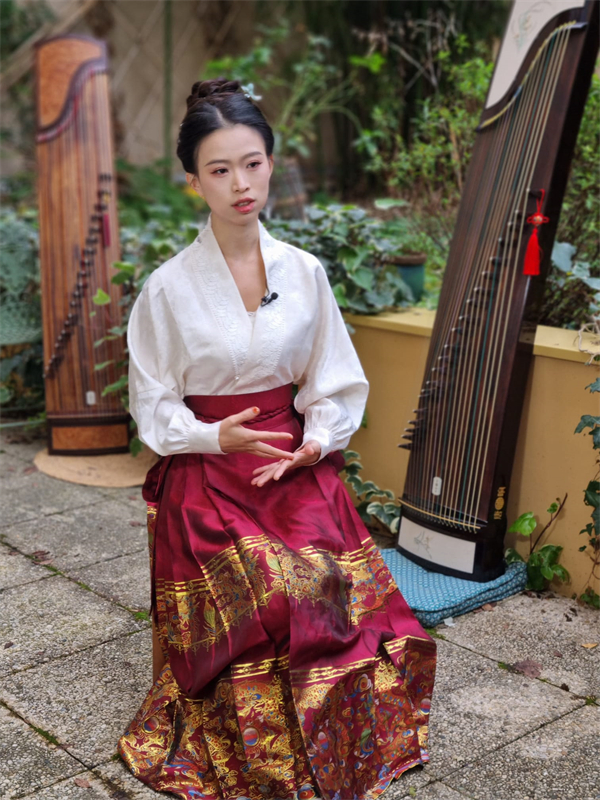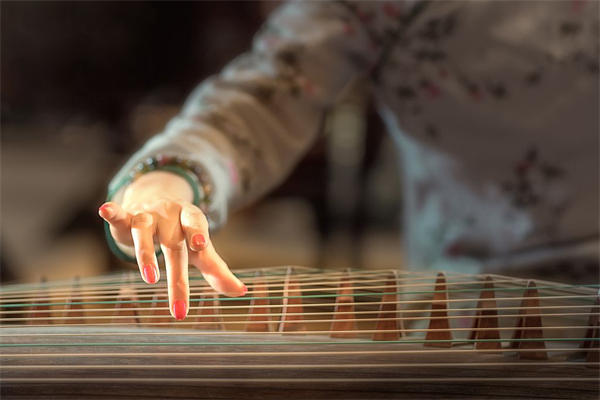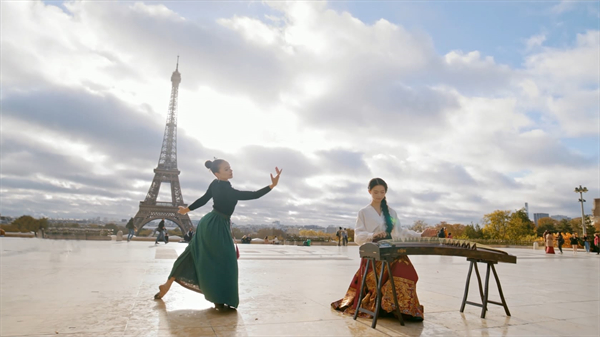Peng talks about her music /CGTN Europe A musical journey Born in central China's Hunan Province in 1995, Peng Jingxuan has been fascinated by the unique sound of guzheng since she was a child. "I started learning guzheng when I was seven years old – I've been exposed to music since I was a child," she says. "I had a good atmosphere at home, as my mother likes to sing folk songs. My bedtime lullabies were always those songs." The guzheng has a history dating back more than 2,500 years – indeed, the 'gu' character can literally be translated as 'ancient'. It usually has 21 strings, although different versions may have a few more, and is laid horizontally to be played while seated. The main body is a rectangular wooden box, normally made from Paulownia wood (named for a 19th-century Dutch Queen Consort who was herself named for her father, Tsar Paul I of Russia). Each string has one tone, arranged according to the pentatonic scale and capable of creating sounds of intense expression. "The special thing about guzheng is that it uses rhyme to complement the sound. I think it has special charms," says Peng. "One of the charms of guzheng is that you can use your left hand to make rhymes, while supplementing every note made by your right hand." Street performances After graduating from the Wuhan Conservatory of Music with a degree in Chinese music in 2017, Peng went to France to pursue studies in music theory. The prevailing culture of street performance in the country reminded her of the guzheng and inspired her to take a leap. And the result? In the summer of 2018, wearing a Chinese-style white dress, Peng put on her first ever guzheng street performance – right in front of the opera house in Bordeaux. "Before the performance, I felt quite nervous and uneasy, because I didn't know what would happen, it's all unknown," she admits. "During the performance, I didn't think so much and I really enjoyed it. Afterwards, many people came over to talk to me. They were very surprised to see this instrument in France, and they encouraged me a lot." Music without boundaries Peng's first success encouraged her to perform more and to build connections with those she had never met before. "There was a time when I was in Nice in France, I met a street artist who was playing the piano, and then we had an impromptu performance together. I found it quite unforgettable," she recalls. The guzheng's plaintive song has affected many of its listeners – and made them want to learn more. "I have met many older French people on the street who like this instrument very much," Peng says. "After listening to my music, they may want to travel to China, because the music is very beautiful." Because so many people are curious about guzheng, she made little pamphlets to introduce its history and culture. She also patiently taught foreigners to pronounce guzheng in Chinese. "Music has no borders. You can use the most direct sound to touch everyone's hearts," she says. "I want to convey what the music wants to express through each of my performances. Whether it's romantic love or sad stories, they can all be perceived." To have a better visual impact when performing, Peng likes wearing hanfu – traditional Chinese costumes with a history dating back more than four millennia. And there's definitely no shortage of color and style in her wardrobe. "The idea of wearing hanfu initially came from one of my fans," smiles Peng, "and I think it perfectly matches guzheng." Peng Jingxuan: Striking the right chord in France Online sensation Peng also posted videos online of her performing, but never expected she would one day become an internet sensation. At present, she has more than 20 million fans across different online platforms. Peng mostly plays traditional Chinese pieces, but as her popularity grows, she's eager to create a fusion of tradition and modernity, and to enjoy new collaborations with other artists. "Now I feel I have more sense of responsibility, because I have a group of fans behind me to support me," she says. "Meanwhile, the audience you face on the street are international friends who like Chinese culture very much. With a responsibility to spread Chinese culture and its music, I feel that I have a sense of mission." Peng has more than 20 million online followers /Peng Jingxuan Music as a cultural bridge As a Chinese cultural ambassador, Peng hopes that music can bring China and France closer. "I hope in the future we will have more frequent exchanges, including Chinese musicians and orchestras coming to France to present Chinese instruments and music," she says. "I also hope more French artists can go to perform in China. With the occasion of the 60th anniversary of China-France ties, I hope more French people can understand China better. We can make our friendship even deeper." With her guzheng, Peng has left her footprints and notes in many landmarks in France, including the Grand Theater of Bordeaux, the Eiffel Tower and the banks of the Seine. Looking to the future, she hopes to take her music to the streets of different countries, as she believes what belongs to one nation, also belongs to the world. "I hope to travel with guzheng in the future," she says, "whether it's online or in reality, I hope to use my humble efforts to let more people better understand Chinese culture."


Peng Jingxuan: Striking the Right Chord in France
Editor:谭婕倪
Source:enghunan.gov
Updated:2024-05-06 11:03:50
Source:enghunan.gov
Updated:2024-05-06 11:03:50
Special
Contact
Welcome to English Channel! Any suggestion, welcome.Tel:0731-82965627
lisl@rednet.cn
zhouqian@rednet.cn











